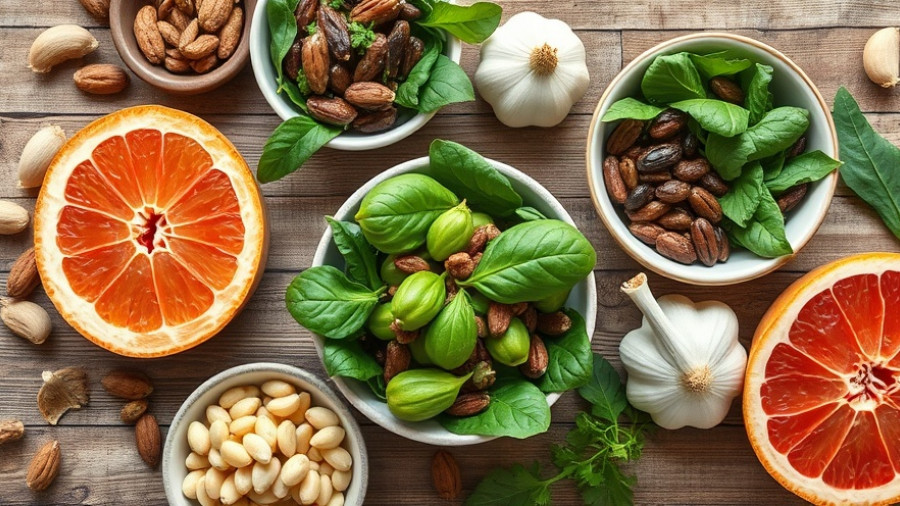
Unlocking Nature's Fountain of Youth: The Role of Food in Aging
As we delve into the insightful findings shared in the video "Friday Favorites: How to Naturally Reduce Wrinkles with Food," it’s clear that our dietary choices have profound effects not just on our health but also on our appearance. The notion that what we eat affects our skin's aging process is increasingly supported by scientific evidence. This exploration highlights how foundational dietary habits can significantly alter wrinkle severity and overall skin health, presenting a compelling case for a shift towards a more plant-based, nutrient-rich diet.
In 'Friday Favorites: How to Naturally Reduce Wrinkles with Food,' the discussion dives into the intricate relationship between diet and skin health, exploring key insights that sparked deeper analysis on our end.
The Antioxidant Advantage: How Foods Combat Wrinkles
The video mentions intriguing population studies linking healthier eating patterns to a reduction in facial wrinkles. It's not just coincidence; scientific theories suggest that antioxidants found abundantly in fruits, vegetables, and nuts play a crucial role in combating oxidative stress that accelerates aging. This protective mechanism occurs through various pathways: antioxidants reduce inflammation, enhance collagen production, and improve DNA repair, thereby preserving skin elasticity and vitality.
Among these foods, yellow vegetables and legumes stand out. Their vibrant colors often indicate high levels of carotenoids, which are known for their skin-protective properties. Incorporating ample servings of these foods may not only shield the skin from sun damage but also slow down the overall aging process.
Scientific Studies That Shed Light on Wrinkle Reduction
The landmark study on almonds referenced in the video solidifies the argument for daily nut consumption as a means to enhance skin health. Participants who consumed two ounces of almonds daily exhibited a significant reduction in wrinkle severity over a 16-week study period. This research underscores the importance of including nuts in our diet—not only do they contribute to cardiovascular health, but they also serve as potent tools in combating signs of aging.
Curiously, the almond study was financed by the Almond Board, leading to some skepticism about its objectivity. However, the meticulous methodology ensured that participants were unaware of their group assignments until the very end, lending credibility to the findings. This underscores the concept that even modest amounts of nuts can yield substantial benefits across various aspects of health, including skin integrity.
Broader Implications: Food Choices for Health and Vanity
One of the most compelling takeaways from the video is the intertwining of aesthetic desires with health benefits. As research increasingly aligns everyday choices with long-term health outcomes, it highlights a potential shift in public perception. Emphasizing foods that improve one’s appearance could motivate broader dietary changes, which, in turn, might reduce the incidence of chronic diseases.
Imagine a world where dietary choices aimed at reducing wrinkles lead to fewer heart attacks. This idea invites a discussion on public health strategies, suggesting that health campaigns could be more effective if they integrate benefits that resonate with individual vanity and self-esteem.
Taking Action: How to Harness Food for Youthful Skin
The potential for achieving a youthful appearance through dietary changes is within reach. Here are some actionable insights to help you get started:
- Increase Fruit and Vegetable Intake: Aim for a diet rich in colorful produce, particularly those high in antioxidants—dark leafy greens, berries, nuts, and yellow vegetables should be staples in your daily meals.
- Incorporate Nuts Wisely: Introduce almonds and other nuts into your snacks or meals. A handful a day can be an effective way to harness their benefits without overwhelming your diet.
- Balance Protein Sources: While meats are a part of many diets, consider incorporating more plant-based proteins. Beans, lentils, and soy products offer alternatives that are linked with better skin outcomes.
- Mindful Eating: Take time to assess your eating habits. Are you reaching for functional foods that support not just health but also aesthetics? Small changes can lead to significant benefits.
By prioritizing these dietary adjustments, we can embark on a journey towards a healthier, more youthful appearance that also promotes longevity and vitality.
Conclusion: Embracing the Power of Nutrition
In summary, the information provided in the video casts a spotlight on the undeniable link between diet and aging, highlighting the role of nutrient-dense foods in our quest for better health. This insight presents an exciting opportunity to rethink our food choices—by shifting towards a more plant-based diet, we’re not only advocating for our skin’s health but our overall well-being. Now is the time to take steps towards a lifestyle that aligns with these findings because the best investment you can make is in your health.
 Add Row
Add Row  Add
Add 







Write A Comment